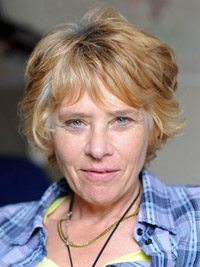Professor Kimberley Scharf is an academic economist with a special expertise in public policy, public finance – national and international taxation, public goods provision, redistribution and the economics of philanthropy and non-profit enterprises. She aims to produce rigorous academic research that is real-world relevant and that is motivated and informed by current issues. Kimberley is a Professor of Economics at Warwick University who is currently on sabbatical from her role, spending most of her time in London where she is a Visiting Professor at the LSE and Inaugural Visiting Scholar at the National Audit Office.

“…it is important for me to make a positive impact on young women, especially those that think they cannot do things, or that think things are too hard for them, or that worry too much about what people think of them. I suppose that just being a sort of “proof of concept” for female academic economists does a bit towards achieving this goal…”
Getting interested in economics
I wasn’t sure what I wanted to study at university and engaged in some experimentation. Eventually, I found economics to be enjoyable and to be something I did well at. To pay for university, I got a job at a restaurant and took out student loans, and finally, after a lot of work, tears and debt, I finished my Bachelor’s Degree and Master’s at the University of Western Ontario and then went on to obtain a Ph.D. in Economics at the University of Toronto.
Along the way, I got married to another economist (a cute Italian who spoke patchy English) and moved to England when we were both hired by the University of Warwick as Assistant Professors. After more hard work and tears, but less debt, I was finally promoted to Professor of Economics, one of only three female economics professors in my department out of a pool of about thirty, and now juggling my time so that I can be a mom to my teenage daughter, and still keep up with my research agenda, travel and other professional activities, including those related to gender.
Understanding how public policies can support private aspirations and social mobility
I became very interested in understanding how public policies can support private aspirations and social mobility, and the extent to which this is a good thing for society and the specific role of information in all of this.

Somewhere along the way, I also realised that the state has a fundamental role to play in supporting the aspirations of people like myself, and from there, it was a natural extension of my interests to learn more about the rationale for why it is important that society values and provides public goods (like education, social support and healthcare) in the first place and how political, economic and social forces weave themselves together and interact in determining what goods and services to provide, how much of them to provide and how to pay for them.
The global financial crisis has served to highlight the importance of my research agenda. Much of my research is concerned with how private charity can sustain itself and be effective in times of rising income inequality and / or austerity, something that is more relevant in times of financial crisis when people have less money and so have to make hard choices about balancing their own private consumption against their support for private charity.
Taking a sabbatical year: Current work at LSE [London School of Economics] and the National Audit Office
During my sabbatical year, I am splitting my time between the LSE [London School of Economics], the National Audit Office and the University of Warwick. Before my arrival at Warwick, its economics department had developed a global reputation for expertise in the economics of public finance and public policy.
Its historical strength in these research areas not only afforded me an opportunity to establish extremely strong and meaningful links with the UK public finance community and think tanks such as the Institute for Fiscal Studies and more recently, David Willet’s Resolution Foundation, but it has provided me with a rich intellectual environment. All of these things have helped me to develop a forward looking and varied research agenda centred on different aspects of public debates about taxes and spending. This year I am continuing with this research agenda and expanding on it.
While I am studying the economics of private charity and related public policies, I also have other non-charities related projects. These include policy relevant projects addressing questions about the effectiveness of pension reform, positive and normative aspects of tax compliance and trade-offs involved with direct versus representative democracy.
Study on pension reform
The study on pension reform is a collaboration with two other public finance economists in the economics department at Warwick, Miguel Almunia and Ben Lockwood. We will use administrative data, obtained from about 70 million UK Self Assessment income tax returns, to provide estimates of the tax sensitivity of individuals’ contributions to pension plans.

The relief for contributions to registered pension schemes is the most important of these tax expenditures quantitatively (apart from the personal allowance), representing a cost of £22.8 billion to the government budget in fiscal year 2012/13.
Project on direct versus representative democracy
The project on direct versus representative democracy is follow-on work from an earlier paper. That spoke directly to the debate about the upcoming UK referendum on the EU and was a collaboration with Michela Redoano, one of the very few female academic colleagues in my department at Warwick. Entry into the European Union was put to a popular vote (referendum) in Scandinavian countries, whereas in some larger European countries it has remained a matter for the national government or legislature to deliberate on.
Whether voters should have a direct input into the choice to participate in international agreements is still hotly debated – a current example being the political battle in the UK over the upcoming referendum on the UK’s EU membership.
In the already published research paper, we showed that delegation of membership decisions to an elected representative can act as a commitment device and result in the citizens of “reluctant” partners to the membership giving up more than they would under decisions made by a referendum. In the new project, Michela and I are drilling into this result to understand more details about the trade-offs involved in the specific context of the upcoming UK referendum.
Spending time as the National Audit Office’s Inaugural Visiting Scholar
This is a particularly busy year for me as I am also spending time as the National Audit Office’s Inaugural Visiting Scholar. This involves me being two days a week at NAO offices in London. When there, I act as an academic advisor for some of the NAO’s Value for Money teams, such as those that are working on tax administration, compliance and tax fraud. The NAO’s recent report on tax fraud, published in December 2015 was the topic of a recent Public Accounts Committee Session and is something that I provided academic input into.
How economists can make a positive impact on the lives of others
I think that economists who specialise in public policy can make a positive impact by working on research that is policy relevant, since, through providing a high quality evidence base, it can be used to underpin policy debates and improve public policies and this benefits everyone in society.
In terms of my own research on philanthropy, I think that stimulating and producing rigorous academic economics research that contributes to the evidence base on philanthropic activities can make a tangible impact on the lives of others as it can provide remedies for enhancing the effectiveness of the charitable sector and public policies and enhance scale economies in information exchange on issues of importance to the philanthropic community and to social entrepreneurs.

I suppose that just being a sort of “proof of concept” for female academic economists does a bit towards achieving this goal; but I also actively engage through supporting young female economists in my role as mentor for the RES [Royal Economic Society] Women’s Committee mentoring programme, and young women more generally, economists or not, by giving talks, mainly about how I faced my own challenges, as one of Robert Peston’s Speakers4Schools.
The work of the Royal Economic Society Women’s Committee
The Royal Economic Society is the oldest Economics Society in the world, having been established in 1890 to promote “the study of economic science.” Initially it was called the British Economic Association, but became the Royal Economic Society on receiving its Royal Charter in 1902. For many years there were, and there still are, general long-standing concerns among members of the Royal Economic Society that women are not being attracted to the economics profession, which was and continues to be male dominated.
The outcome of these concerns was the establishment of the Royal Economic Society Women’s Committee, which was set up in May of 1996 to promote the role of women in the UK in the economics profession as a way of redressing the gender balance. Members of the committee are drawn from academia, business and the civil service. Its activities include a biennial investigation into the position of women in economics used to evidence and bring attention to the under-representation of women in economics, mentoring schemes aimed at supporting early career female researchers, and sharing best practise through linking with similar networks around the world.
Representation of women in economics in academia and how are initiatives like the Athena SWAN diversity charter are helping
The RES Women’s Committee publishes a bi-annual survey of the gender balance of academic economists in the UK. The most recent report, which covers 2014, can be found here.
There is some positive news in its headline findings. In comparison with earlier surveys, the proportion of the workforce that is female has increased substantially over the eighteen years of surveys (in 1996 women made up 17.5% of the workforce, by 2014 this has risen to 27%). Not only that, but the numbers of Professors amongst all staff has doubled over the time period (from 14% of all staff to 28%), and women are roughly twice as common in the standard academic grades in 2014 than they were in 1996 when they made up approximately 15% of the Lecturers (31% in 2014), 10% of the Readers / Senior Lecturers (27% in 2014) and 5% of the Professors (14% in 2014).
But there are some concerning emerging findings too. For the first time since it started, the RES Women’s Committee has been able to track the submission of individuals in the UK’s 2014 Research Excellence Framework (REF) exercise. Preliminary results of that analysis suggest that women were considerably less likely to be submitted (50% of the male academic economists were submitted and only 38% of the females).
I am looking forward to reading the final results in more detail when they are published by the Women’s Committee later in 2016, but if the preliminary results are indicative of the possibility of gender bias in REF submissions, then there could be long run career implications for female academic economists and that would be very worrisome.
Advice to other women and girls interested in economics
A lot of advice would be valid for everyone, not just women. Take a situation involving professional rejection. In my own experience, at the start of my career, if a piece of my research received bad reviews or got rejected from a journal, then I would start thinking about all the wrong reasons for this.
Reasons would often have nothing to do with the quality of the paper, but rather would include things like “the referee doesn’t like me”; “the editor doesn’t like me”; “the paper got rejected because I am a woman”; and so on. At some point I realised that many of these things may well be true, but that it was really not helpful for me to dwell on them or to even contemplate them. It is not just my own experience that tells me this, there is even some evidence to suggest that dwelling and contemplating on these things leads to alienation, isolation and shame!
For anyone wanting to be an academic economist, I would say to remember that in the end, academic success depends on the quality of what one writes; therefore, the best and strongest weapon that against perceived, imagined or real injustices is to take any rejection at face value and to tackle things that are written in the reports and the editor’s letter on intellectual merit.

As I mentioned, this kind of advice is for all people, and not just women; however, it is really well documented that women have a different way with dealing with social interactions and so they might take rejection and / or disapproval more personally than men do and this could weaken them. From this perspective I would say to women to not fear being intellectually pushy and not to worry about being liked at the personal level – it doesn’t matter that much.
Smiles and friendly looks can actually be patronising and, even if some of them might be genuine – they might also imply a lack of respect. For example, sometimes my mom does not believe that I can make any sense but she smiles at me a lot anyway, and I’m pretty sure that she loves me. On the other hand, somebody might not be smiling at you at the personal level but they could respect you and your work and the thing that matters is that, not the smiles (comforting as they may feel).
Finally, I suppose that women should support one another and firmly resist engaging in female competition on the job. There is some emerging evidence that some women compete along gender lines, i.e. they want to be the most successful woman at their job and not necessarily the most successful person at their job. Space limitations preclude me from listing all of the reasons for why that kind of behaviour is damaging, not only to individual women, but to all women. Just don’t do it.
Coming up in 2016
First, all of my NAO interactions have been fascinating and extremely rewarding and I really want to make arrangements that will ensure that my relationship with the NAO continues to be strong and productive long after my sabbatical year finishes.

Relational altruism is what I call it when individuals donate to a cause, not because they care about the cause, but because the cause is something that friends and / or family care about. Understanding the way that this works will help us to understand more about the specific role that social interactions play in giving decisions, even though more than 60% of giving occurs in social situations, we know very little about the specific channels through which social situations affect giving.
I also want to finish some research that is looking at how charitable giving responds to natural disasters and whether or not disaster induced increases in giving result in less giving to other causes, something that charities worry about. Interestingly, our preliminary results suggest the opposite, that is, that people seem to respond to natural disasters by giving more to all kinds of causes, not just those related to the disaster.
Third, I have a number of upcoming activities that I am organising around my research projects. These include joint workshops aimed at convening academics, practitioners and businesses (e.g. an upcoming 2016 Economic and Social Research Council (ESRC) and Charities Aid Foundation (CAF) sponsored “Research on Disasters Day” and an “ESRC / CAF Corporate Social Responsibility and Responses to Natural Disasters Brunch”, which will bring together business leaders and academics from a variety of disciplines to deliberate on questions of corporate social responsibility and supply chains that originate in countries susceptible to natural disasters).
Finally, the most important thing. I am pretty busy and work seven days a week so I am making plans to take a few days off over Easter so that I can spend some quality time with my husband and my daughter!
http://www2.warwick.ac.uk/fac/soc/economics/staff/kascharf
https://twitter.com/KimberleyScharf
https://twitter.com/warwick_socsci





